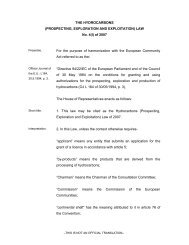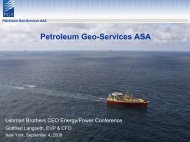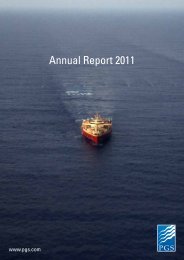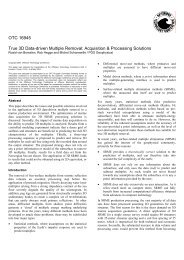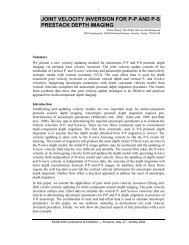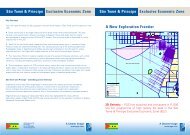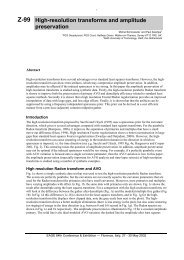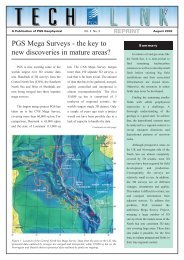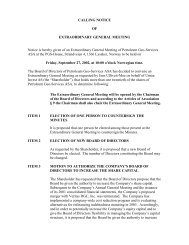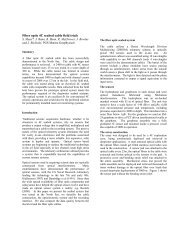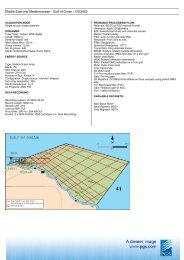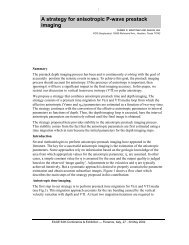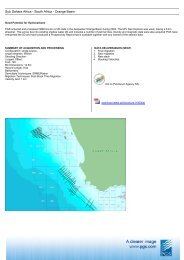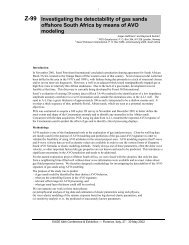Arrow Prospectus - PGS
Arrow Prospectus - PGS
Arrow Prospectus - PGS
Create successful ePaper yourself
Turn your PDF publications into a flip-book with our unique Google optimized e-Paper software.
ARROW SEISMIC ASA – INITIAL PUBLIC OFFERING<br />
separately for tax purposes from the main pool of expenditure for as long as the ship is used wholly for trading<br />
purposes.<br />
A special free deprecation system exists, such that unused allowances which may arise in periods of low<br />
profitability can be carried forward and used in addition to the full writing down allowances in the next year.<br />
There is further flexibility allowed in that any balancing charge (a clawback of allowances in excess of economic<br />
depreciation) arising on disposal of a ship, whereby the charge may be deferred against capital expenditure<br />
incurred in the following years.<br />
As noted above, ships are not currently included within the long life asset regime and are therefore generally<br />
benefit from the standard 25% rate (likely to be 20% from 2008). In addition it is not essential that a ship is in<br />
use for allowances to be claimed; as long as it will be brought into use within three years, allowances can be<br />
claimed during the construction period.<br />
Relief for trading losses<br />
Trading losses may be used to relieve other income and chargeable gains for the year in which the loss was<br />
incurred and the preceding year, providing the trade was then carried on. Losses may also generally be carried<br />
forward without time limit for relief against future trading profits from the same trade, although there can be<br />
limitations on change of ownership.<br />
A trading loss arising in one company may be offset against the profits (including capital gains) from the same<br />
period of another company within a defined 75%-owned group of UK companies subject to some restrictions.<br />
The tests for 75% group status, for these purposes, is specifically defined by UK legislation. Assuming that<br />
these conditions are met should therefore be possible for all group companies to offset trading losses.<br />
Capital gains groups<br />
Assets may be transferred between group companies which are in a 75% worldwide group (as defined) without a<br />
capital gain arising, if the companies involved are subject to UK corporation tax. For these purposes the 75%<br />
group is not the same as the group relief group mentioned above and again is specifically defined in UK<br />
legislation.<br />
However if the transferee company leaves the group within 6 years, of the transfer date, the transferee is deemed<br />
to have disposed of the assets immediately after the start of the accounting period of departure. The valuation<br />
for disposal purposes however is taken at the value of the asset immediately following original inter-group<br />
transfer.<br />
Withholding Taxes<br />
Dividends<br />
The UK does not impose withholding tax on dividend payments under domestic law.<br />
Interest<br />
The standard UK withholding tax rate on interest is 20%. This is reduced to zero on application of the UK<br />
Norway Tax Treaty subject to certain antiavoidance provisions.<br />
Royalties<br />
The standard UK withholding tax rate on royalties is 22%. This is reduced to zero on application of the UK<br />
Norway Tax Treaty subject to certain anti-avoidance provisions.<br />
UK Tonnage Tax<br />
Assuming that the relevant companies are, and remain UK resident for corporation tax purposes, the UK tonnage<br />
tax regime generally follows a model adopted by several other European countries, under which ordinary profits<br />
related to shipping activities are replaced by profits calculated on the basis of net tonnage of qualifying ships.<br />
75



